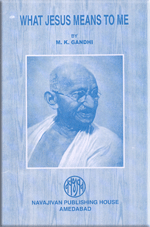
P.O. SEVAGRAM, DIST.WARDHA 442102, MS, INDIA. Phone: 91-7152-284753
FOUNDED BY MAHATMA GANDHI IN 1936
What Jesus means to Me

WHAT JESUS MEANS TO ME
Written by :
M. K. Gandhi
Compiled by :
R. K. Prabhu
Table of Contents
- My early studies in Christianity
- The Sermon on The Mount
- Why I am Not A Convert To Christianity
- Only Begotten Son of God?
- What Jesus Means To Me
- The Message of Jesus
- The Jesus I Love
- Christ - A Prince Amongst Satyagrahis
- The Greatest Economist of His Time
- Proselytization
- For Missionaries in India
- For Christian Indians
- For Christian Friends
- Value of Scriptural Texts
- Western Christianity Today
- To The Ceylonese Youth
- Some Questions And Answers
- Appendix I : Sermon on The Mount
- Appendix II : Two Favorite Christian Hymns of Gandhiji
About This Book
Written by :M. K. Gandhi
Compiled by :R. K. Prabhu
First Edition : 10,000 copies, September 1959
I.S.B.N :81-7229-387-9
Printed and Published by : Jitendra T. Desai,
Navajivan Mudranalaya,
Ahmedabad - 380 014,
India.
© Navajivan Trust, 1959
Download
Chapter-12: For Christian Indians
If Indian Christians will simply cling to the Sermon on the Mount, which was delivered not merely to the peaceful disciples but a groaning world, they would not go wrong, and they would find that no religion is false, and that if all live according to their lights and in the fear of God, they would not need to worry about organizations, forms of worship and ministry.
Young India,
22-9-1921
As I wander about throughout the length and breadth of India I see many Christian
Indians almost ashamed of their birth, certainly of their ancestral religion,
and of their ancestral dress. The aping of Europeans on the part of
Anglo-Indians is bad enough, but the aping of them by Indian converts is a
violence done to their country and, shall I say, even to their new religion.
There is a verse in the New Testament to bid Christians avoid meat if it
would offend their neighbours. Meat here, I presume, includes drink and dress. I
can appreciate uncompromising avoidance of all that is evil in the old, but
where there is not only no question of anything evil, but where an ancient
practice may be even desirable, it would be a crime to part with it when one
knows for certain that the giving up would deeply hurt relatives and friends.
Conversion must not mean denationalization. Conversion should mean a definite
giving up of the evil of the old, adoption of all the good of the new and a
scrupulous avoidance of everything evil in the new. Conversion, therefore,
should mean a life of greater dedication to one's own country, greater surrender
to God, greater self-purification.
I know that there is a marvellous change coming over Christian Indians. There is on the
part of a large number of them a longing to revert to original simplicity, a
longing to belong to the nation and to serve it, but the process is too slow.
There need be no waiting. It requires not much effort.... Is it not truly
deplorable that many Christian Indians discard their own mother-tongue and bring
up their children only to speak in English? Do they not thereby completely cut
themselves adrift from the nation in whose midst they have to live?
Young India,
20-8-1925